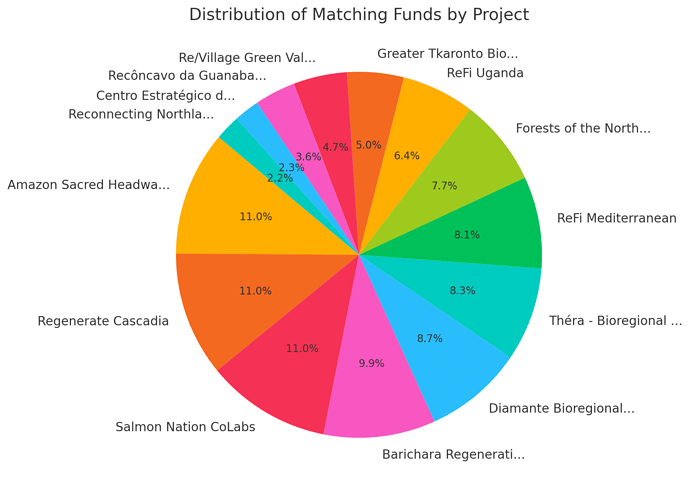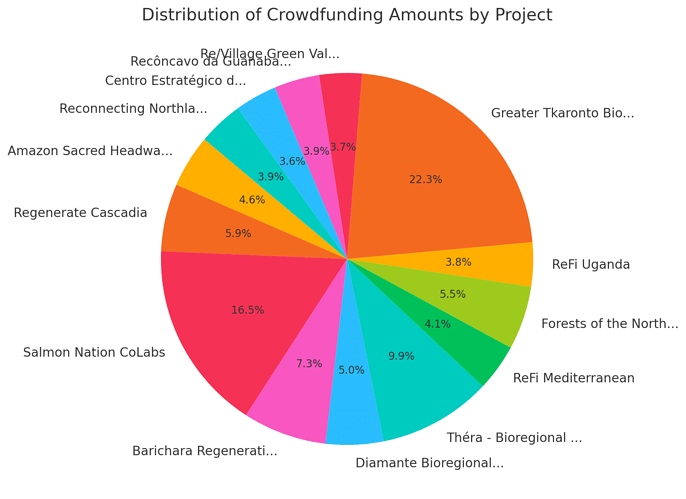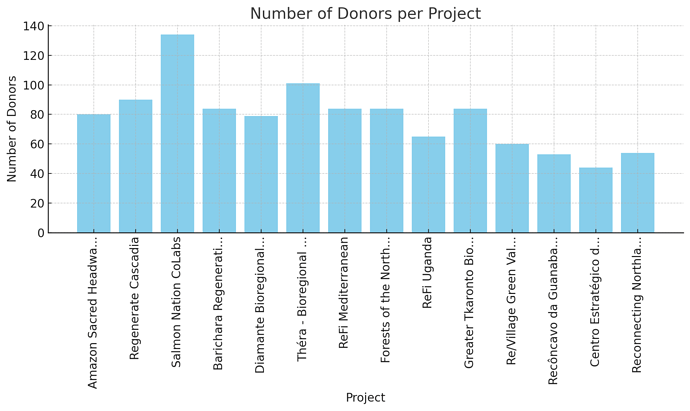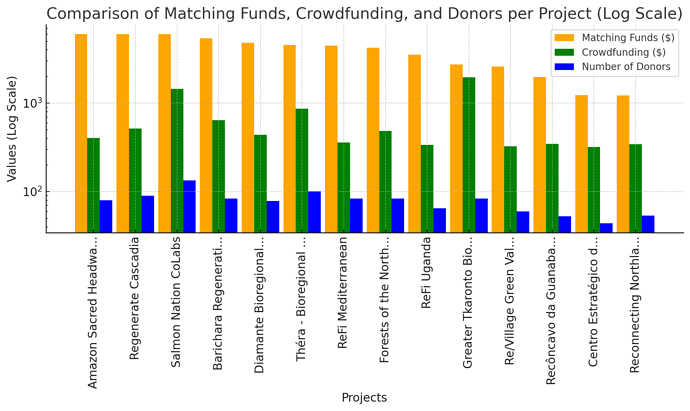BioFi Pathfinders Grant Round: Retrospective Analysis and Reflections
Introduction and Context
The BioFi Pathfinders Grant Round marked a pivotal first step in connecting the bioregional organizing world with web3, ReFi, and Gitcoin communities. The round served many complimentary functions in the re-emerging bioregional movement, highlighting exemplary bioregional organizing teams and equipping them with funds to continue exploring bioregional finance, while simultaneously forging new bridges into the world of web3. By onboarding 14 bioregional organizing teams to web3 and onchain participatory budgeting, the round invited bioregional organizers to navigate and leverage decentralized tools while also introducing the web3 community to the profound and transformative work of bioregionalism. The round served as a showcase of the diversity of approaches and groundbreaking whole systems visions of a range of bioregional efforts.
As a space for mutual learning between grantees, community members, and technical teams, the round offered insights into the unique challenges and opportunities of using web3 in a bioregional context. Beyond the financial outcomes, the grant round’s true success lay in fostering connections, generating content, and creating a foundation for future iterations that align with the ethos of collaboration, participation, regeneration, and learning.
Key Learnings and Reflections
1. Access and Equity in Global Participation
One of the most significant challenges identified in this round was the difficulty faced by some grantees in the Global South in accessing technology and infrastructure necessary to engage with web3 interfaces effectively. These teams required workarounds and intermediaries to overcome barriers like unreliable internet and electricity, and lack of compatible devices.
In contrast, one grantee in the Amazon already possessed significant pre-existing knowledge of blockchain technologies. Not only was he comfortable interacting with web3 tools, but he was also actively staking CELO tokens, demonstrating the global reach of decentralized protocols.
This juxtaposition underscores the need for a continued focus on accessibility while celebrating the impact web3 can have even in remote regions around the world.
2. Success of the PayPal Option
A critical addition to this round was the inclusion of PayPal as a payment option, made possible through collaboration with viaPrize. This feature significantly lowered the barrier of entry for donors, enabling bioregional organizing teams to mobilize their existing donor bases effectively. PayPal’s familiarity and ease of use brought 97 donors into the round who would have otherwise been excluded due to technical or logistical challenges associated with web3 wallets. The impact of this integration highlights the importance of blending traditional tools with decentralized ones in a pluralistic and open source methodology to achieve maximum web3 adoption by leveraging the accessibility of traditional financial tools.
3. Inter-Organizational Collaborative Dynamics
The organizing team for this grant round comprised individuals from a diverse range of aligned organizations. Each brought unique expertise, resources, and perspectives into what was truly a joyful and seamless collaboration. The success of this inter-organizational approach is a testament to the non-rivalrous culture in the regenerative movement and the power of working together to execute a complex initiative through collaboration. The team’s combined familiarity with Allo Protocol, video editing, marketing, network weaving, web3 onboarding, storytelling, and grantee support ensured that the round operated smoothly, laying a strong foundation for future rounds.
4. Media Creation
A significant highlight of the round was the media generated to showcase the projects and their impact. The following media content was created:
- A short-form trailer introducing the ethos and vision of the round.
- Grantee Spotlight videos, including Regenerate Cascadia, Salmon Nation, Tera, and Re/Village.
- Additional highlight videos are slated for release in the coming weeks, to continue sharing the amazing work of grantees..
These media pieces not only amplified the visibility of the grantees but also revealed critical commonalities and unique capacities of each bioregion while sharing the powerful personal journeys of organizers.
5. Patterns of Synergy and Collaboration
The round revealed several patterns of overlap and synergy among the participating projects. Many grantees shared common goals, from developing eco-credits and bioregional hubs to designing governance and flow funding mechanisms to increasing capacities in impact metrics and reporting. These shared infrastructural and design needs offer a strong foundation for future collaboration, potentially leading to innovative partnerships and aligned efforts across bioregions. Recognizing and nurturing these synergies could multiply the impact of future rounds and catalyze systemic change at the bioregional and planetary scale.
6. Cross-Network Bridging
This round served as a critical weaving phase for both grantees and organizers. Bioregional organizing teams from various networks were connected with each other as grantees, some meeting for the first time as they collaborated to solve common challenges and learned about web3 together. Similarly, the web3 community deepened its understanding of bioregionalism through the media and storytelling generated by the round and in the Gitcoin, Let’s Grow DAO, and BioFi X spaces where grantees contributed their voices.
7. Technical Bugs Reported
A technical challenge with Rainbow Wallet was highlighted for the Gitcoin team who immediately sprang into action to address it. Similarly, outages in the grant round were quickly addressed by the Gitcoin team, with some team members even working over the weekend to make sure we were back online as soon as possible. The Passport team also rapidly addressed a bug in the matching calculation web app to make sure we could whitelist the wallet addresses from viaPrize, a feature they had custom built to make viaPrize integration possible. We’re grateful for their above and beyond support.
8. Co-Promotion Across Regenerative Grant Rounds
One of the deepest cultural successes of the BioFi Pathfinders round, and GG22 more broadly, was the presence of and collaboration between so many regenerative-focused Community Rounds. As a deeply aligned network of networks, round operators from BioFi Pathfinders, Ma Earth and Regen Citizens Rounds came together alongside Mathilda and Owocki from Gitcoin to share experiences and insights in a co-promoted X space.
The space fostered dialogue across regenerative networks, not only amplifying the individual rounds but also created a sense of collective effort and solidarity across the broader regenerative ecosystem. The success of this co-promotion highlights the power of inter-round collaboration, setting a precedent for future efforts to align and synergize across Community Rounds.
9. Funding as a Learning Tool:
While fundraising is an important metric, the core purpose of the round was to use funding as a tool to understand and refine mechanisms for supporting regenerative projects. Exposing the BioFi and bioregional organizing teams to quadratic funding (QF) and cluster matching led to key discussions about these methodologies, surfacing valuable insights with regard to how bioregional organizing teams might be able to further refine and scale these mechanisms.
10. Next Steps and Future Plans:
The cohort of 14 grantees will now continue their learning journey as they develop their BioFi capacities, and will be encouraged to share in their Telegram group any learnings, experiments, or requests for support around web3, gitcoin, or beyond. The round operations team looks forward to staying in touch as well and continuing to offer learning and collaboration supports there. We’re excited to continue collaborating and iterating with Gitcoin to bring the power of quadratic funding to these bioregional organizing teams, with the potential of a diverse range of grant rounds to follow. We’ll be announcing plans for future rounds as well as a few other exciting collaborative opportunities in the coming weeks and months.
Data Analysis
Summary of Matching Funds, Crowdfunding, and Donors by Project
| Rank | Project | Matching Funds | Crowdfunding | Donors |
|---|---|---|---|---|
| 1 | Amazon Sacred Headwaters Alliance | $6033.47 | $403.69 | 80 |
| 2 | Regenerate Cascadia | $6033.47 | $517.41 | 90 |
| 3 | Salmon Nation CoLabs | $6033.47 | $1,456.59 | 134 |
| 4 | Barichara Regenerativa | $5420.59 | $641.69 | 84 |
| 5 | Diamante Bioregional Consortium (Costa Rica) | $4796.92 | $441.04 | 79 |
| 6 | Théra - Bioregional regeneration in the southwest of France | $4547.01 | $868.79 | 101 |
| 7 | ReFi Mediterranean | $4452.65 | $359.19 | 84 |
| 8 | Forests of the Northeast | $4212.51 | $486.45 | 84 |
| 9 | ReFi Uganda | $3533.62 | $338.23 | 65 |
| 10 | Greater Tkaronto Bioregion (Canada) | $2747.4 | $1,963.1 | 84 |
| 11 | Re/Village Green Valley | $2591.4 | $325.65 | 60 |
| 12 | Recôncavo da Guanabara Bay Bioregional Fund: Restoring Ecological Integrity and Socioeconomic Resilience. | $1986.16 | $347.11 | 53 |
| 13 | Centro Estratégico de Desarrollo de la Península de Osa (CEDPO) | $1237.23 | $320.03 | 44 |
| 14 | Reconnecting Northland | $1223.85 | $344.46 | 54 |
Data Visualization
- Distribution of Matching Funds by Project
- Distribution of Crowdfunding Amounts by Project
- Number of Donors per Project
- Comparison of Matching Funds, Crowdfunding, and Donors per Project
A Note on Cluster Matching
Cluster matching is a new approach in funding allocation that enhances the quadratic algorithm by prioritizing diversity of donor support. Unlike traditional quadratic matching, which amplifies contributions based on total donations, cluster matching emphasizes the breadth of donor engagement. This method ensures projects with contributions from a wider range of donors receive proportionally higher matching funds, empowering newer projects with smaller communities to compete on a level playing field. This approach does, however, reward projects differently than standard quadratic funding. For that reason, we chose a 50/50 split between the cluster matching method and traditional quadratic funding to create a matching allocation result that is balanced and ensured all projects fell above the $1k minimum matching threshold.
Conclusion
The BioFi Pathfinders Grant Round was a remarkable beginning, emphasizing learning, bridging, and mutual inspiration. It successfully highlighted the transformative power of bioregionalism on a global scale, setting the stage for deeper collaboration and refinement in future rounds. The success of co-promotion with other regenerative grant rounds illuminates the potential for a unified ecosystem of regenerative initiatives, amplifying our collective impact.
While financial outcomes provided a tangible measure of success, the round’s true impact lay in the relationships built, the lessons learned, and the collective story told about the potential of bioregionalism to catalyze local and global action.
The round highlighted the diversity and depth of bioregional projects, showcasing their capacity to address ecological, social, and economic challenges in ways that are locally grounded yet globally relevant. By curating exemplary initiatives, generating engaging media, and amplifying the visibility of bioregional efforts, the round served as both a platform for grantees and an invitation to the broader world to engage with bioregionalism as a critical piece of the regenerative puzzle.
By bringing together 14 bioregional organizing teams, hundreds of donors, and thousands of contributions, the round successfully bridged worlds—connecting bioregional communities with web3 tools and narratives while introducing web3 communities to the transformative power of bioregionalism. This mutual exchange laid the groundwork for further experimentation, iteration, and growth.
As this round concludes, it is not the end of the journey but the continuation of a movement that seeks to weave together the global and the local, the technological and the ecological, the visionary and the practical. The BioFi Pathfinders Grant Round has raised not only funds but also the critical importance of bioregionalism in a rapidly changing world, setting a powerful precedent for what is possible when communities come together to co-create a regenerative future.



